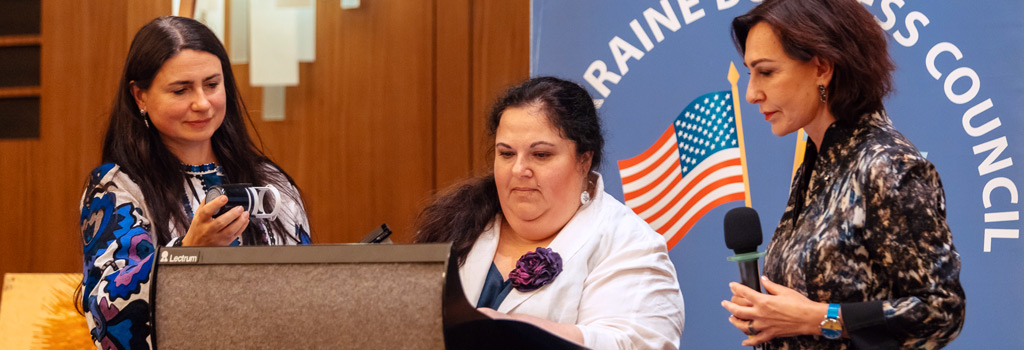Featured Galleries USUBC COLLECTION OF OVER 160 UKRAINE HISTORIC NEWS PHOTOGRAPHS 1918-1997
 Holodomor Posters
Holodomor Posters

INTERVIEW WITH TARAS VERVEGA, CO-FOUNDER AND BOARD MEMBER OF SOFTSERVE
.jpg) U.S.-Ukraine Business Council (USUBC),
U.S.-Ukraine Business Council (USUBC),
Wash, D.C., Tue, June 09, 2020
.jpg) Global shutdown harmed economies and we are now heading to slow reopenings. This will be a different world. The impact of the coronavirus (COVID-19) is felt by all businesses around the world and has a significant impact on the IT sector.
Global shutdown harmed economies and we are now heading to slow reopenings. This will be a different world. The impact of the coronavirus (COVID-19) is felt by all businesses around the world and has a significant impact on the IT sector.
IT leaders need to consider the role of technology to support business continuity in all scenario planning.
Leader in IT industry - SoftServe is a global company with Ukrainian roots specializing in digital advisory, consultancy services and software development. The company is headquartered in Lviv and Austin (Texas, USA) with more than 8,000 employees working in the company's European and American offices. SoftServe is one of the largest software development companies in Central and Eastern Europe and is one of the three largest outsourcing companies in Ukraine.
IT leader and philanthropist Taras Vervega, Co-Founder and Board Member of SoftServe gives his views on the business, economy, working lifestyle and the world after COVID-19.
COVID-19 wreaked havoc across the world. How did it affect the IT sector and SoftServe?
The quarantine has two ways of influence. First, it is the quarantine itself, it is prohibited to visit the office, to meet the people in other words you have a new lifestyle.
In this regard, IT business, our company has the best position toward other businesses. I can hardly imagine which business or industry has more advantages. Even before the quarantine a lot of people in SoftServe worked remotely and traveled. In general, the company infrastructure has been built for remote work.
The company working style has not changed. IT industry can work with almost the same force during the quarantine as it was before. Of course, KPI decreased a bit, virtual meetings are effective but not yet effective as the face-to-face meetings, but it compensates in terms of working time because people do not spend time for transport, people do not visit any places, as a result, they spend more time on work as the only opportunity to do something in this challenging time.
The second is the economic influence on markets, businesses, buyers, and sellers. SoftServe is a business that feels the quarantine impact. For example, we have a client in the cruise industry, in general, all cruise business activity is on anchor, with pessimistic forecasts for one or two years. Before the quarantine, the client required a lot of services from IT company but as of today, the client cuts its expenses for IT infrastructure development.
The situation like this we see in many industries, including energy, finance, real estate, etc. As a result, it affects SoftServe business. The whole IT industry feels a business recession. A lot of IT companies will suffer, it depends on the client’s portfolio, business connections, etc. Some IT projects will be closed, others will be changed in terms of budget.
How does SoftServe coping amid the COVID-19 crisis?
SoftServe is doing good. Of course, we have some problems like everybody, even compared to our competitors we are doing fine. Starting on March 15, all employees are working remotely and they do visit the office only upon necessity.
The greatest strength and weakness to ensuring your operations continue to run as ‘business as usual’ in this changing work environment is the investment you’ve made in your IT infrastructure. SoftServe IT infrastructure copes with data, security copes with remote work. Despite the difficulties, clients’ satisfaction score is on the rise, employees’ satisfaction score is rising as well. In general, I can't even believe how all is well. Of course, it is not so good as it was before the crisis, but it's a matter of degrees.
As the world's leading IT company, SoftServe is fighting with COVID-19. In early March, SoftServe donated 17 million UAH (10 million from a company and 7 million from its employees) to support medical institutions in their effort to combat COVID-19. The donation directed to the corporate charity fund “Open Eyes” to address urgent medical needs in the Ukrainian cities where SoftServe has offices.
.jpg) The company, in cooperation with the Lviv Regional Council, launched an online platform, ‘STOP COVID-19’. The platform contains a list of medical contacts and facilities in the region, including local family doctors, and an up-to-date map highlighting the locations of current cases of COVID-19 in Ukraine.
The company, in cooperation with the Lviv Regional Council, launched an online platform, ‘STOP COVID-19’. The platform contains a list of medical contacts and facilities in the region, including local family doctors, and an up-to-date map highlighting the locations of current cases of COVID-19 in Ukraine.
Do you see technology also being part of the solution in the fight to beat COVID-19? How IT can help to fight COVID-19?
Every year IT is playing a more important role in our lives. The virus will speed up IT sector development and more IT products will be implemented in day to day activity, business, social life, and economy for everyone and everywhere.
If in the past there was an opposition to IT technology or to something new, then today we have a completely another point of view. A couple of years ago older generations did not pay attention to online food delivery, today under quarantine pressure they are forced to do that. This crisis will change the lives of many people who tried IT products, including teachers, social workers, and all others who did not use IT technology before.
.jpg) In regards to COVID-19 fighting, there is no doubt IT can do a lot. First of all, technology can analyze big data, based on that people will make a better decision, they will be able to develop more sophisticated plans of action. In Singapore or in South Korea a facial recognition system and non-contact temperature measurement were implemented. Without a doubt, IT industry can help, but the problem is that IT tools are like a knife, you can spread butter on bread or cut cheese but you can harm or kill with a knife.
In regards to COVID-19 fighting, there is no doubt IT can do a lot. First of all, technology can analyze big data, based on that people will make a better decision, they will be able to develop more sophisticated plans of action. In Singapore or in South Korea a facial recognition system and non-contact temperature measurement were implemented. Without a doubt, IT industry can help, but the problem is that IT tools are like a knife, you can spread butter on bread or cut cheese but you can harm or kill with a knife.
The same is with IT technology, COVID-19 IT technology implementation (big data), involves the collection of a large array of data about each person. The collected data can be used for good and can be used for bad, especially authoritarian governments can use it for a variety of purposes. A lot of governments can use IT technology to restrict the right to freedom.
In what ways do you think will the world be different once this crisis is over?
It’s too early to know exactly how much the post COVID-19 world will be different, but some important lessons have already become clear.
The world we knew before the coronavirus will not return. An economic and social shock of this scale is not a freeze-frame moment. The balance of global power, the structure of the international and national economies, the role of multilateral agencies, patterns of social interaction and ways of work will all be different. COVID-19 has upended global travel and brought the world to a standstill. For the first time in history, close to 90% of the world’s population now lives in countries with travel restrictions.
Also, COVID-19 will change consumer behavior and purchase patterns, consumer habits are adapting in real-time to the new environment and circumstances. New consumer habits will remain in the long term, while others will fade over time.
The virus has made some known global risks seem less of an immediate concern and at the same time introduced a new set of uncertainties. The economy will be weaker, all countries will revise production chains and will move toward the national production policy. Companies will build redundant logistic connections to ensure the company stability in the times of crisis. The crisis will affect the world for many years to come.
Do you have advices for business?
The first, the companies need to rebuild operations which were caused by COVID-19. I would advise to do all possible steps to maximize cash in and minimize cash out the company for a long period of time (6-12 months).
Next, you need to think about the future, the future will be not the same as we were planning, the business will be changed, habits will be changed, countries policy will be revised toward commercial nationalism. It is time to think over the change of a business model, you need to focus on new technology and new export opportunity. It’s important to build business continuity plans at either end of your supply chain; from suppliers to end-users. As we’ve seen, a reliance on a global supply chain anchored in one country can be detrimental to a business’ continuity.
A lot of people returned to Ukraine, it creates an opportunity for local businesses to hire people with different experience and another vision. Local business can use their knowledge for further development.

















